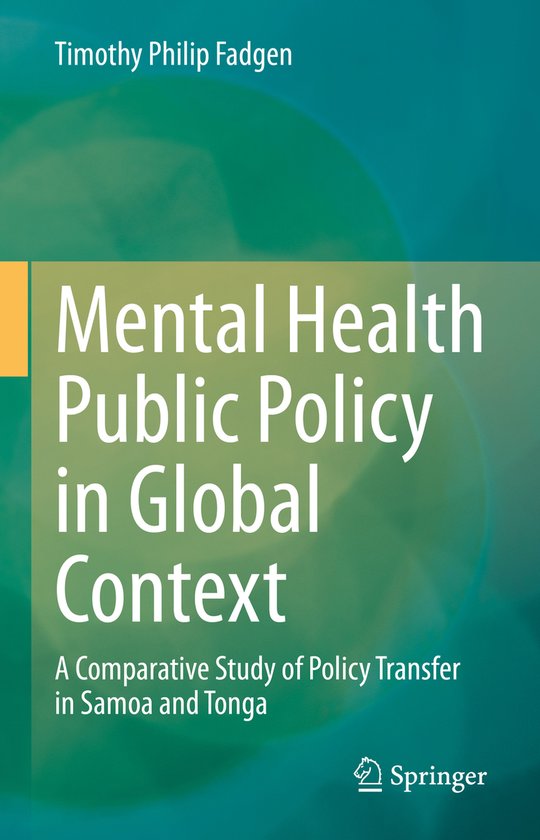Rbizo.com
Mental health public policy in global context

Rubriek: Textual/Printed/Reference Materials - Boek
Prijs: € 125
Rating: 0/5
☆
☆
☆
☆
☆
Verzending:
2 - 3 weken
2 - 3 weken
Inhoudsopgave:
Omschrijving:
This book explores the development of mental health systems in the Pacific Island Countries (PICs) of Samoa and Tonga through an examination of several policy transfer events from the colonial to the contemporary.
This book explores the development of mental health systems in the Pacific Island Countries (PICs) of Samoa and Tonga through an examination of several policy transfer events from the colonial to the contemporary. Beginning in the 1990s, mental health became an area of global policy concern as reflected in concerted international organisation and bilateral aid and development agendas, most notably those of the World Bank, World Health Organization, and the governments of Australia and New Zealand. This book highlights how Tonga and Samoa both reformed their respective mental health systems during these years, after relatively long periods of stagnation.
Using recent scholarship concerning public policy transfer, this book explains these policy outcomes and expands it to include consideration of the historical institutional dimensions evidenced by contemporary mental health systems. This book considers three distinct levels of policy implicated in mental health system transfer processes from developed to developing nations: colonial authority and influence; decolonisation processes; and the global development agenda surrounding health systems. In the process, the author argues that there are in fact three levels of policy change that must be accounted for in examining contemporary policy change. These policy levels include formal policy transfers, which tend to be prescriptive, involving professional problem construction and the designation of appropriate state apparatus for curative or custodial care provision; quasi-formal transfers, which tend to be aspirational and involve policy instruments developed through collaborative, participatory processes; and informal transfers that tend to be normative and include practices by professional actors in delivering service merged with traditional cultural beliefs as to disease aetiology as well as reflecting a deep understanding of the cultural context within which the services will be delivered. This book argues that a renewed focus on the importance of public policy and government institutional capacity is necessary to ensure human rights and justice are secured.
This book explores the development of mental health systems in the Pacific Island Countries (PICs) of Samoa and Tonga through an examination of several policy transfer events from the colonial to the contemporary. Beginning in the 1990s, mental health became an area of global policy concern as reflected in concerted international organisation and bilateral aid and development agendas, most notably those of the World Bank, World Health Organization, and the governments of Australia and New Zealand. This book highlights how Tonga and Samoa both reformed their respective mental health systems during these years, after relatively long periods of stagnation.
Using recent scholarship concerning public policy transfer, this book explains these policy outcomes and expands it to include consideration of the historical institutional dimensions evidenced by contemporary mental health systems. This book considers three distinct levels of policy implicated in mental health system transfer processes from developed to developing nations: colonial authority and influence; decolonisation processes; and the global development agenda surrounding health systems. In the process, the author argues that there are in fact three levels of policy change that must be accounted for in examining contemporary policy change. These policy levels include formal policy transfers, which tend to be prescriptive, involving professional problem construction and the designation of appropriate state apparatus for curative or custodial care provision; quasi-formal transfers, which tend to be aspirational and involve policy instruments developed through collaborative, participatory processes; and informal transfers that tend to be normative and include practices by professional actors in delivering service merged with traditional cultural beliefs as to disease aetiology as well as reflecting a deep understanding of the cultural context within which the services will be delivered. This book argues that a renewed focus on the importance of public policy and government institutional capacity is necessary to ensure human rights and justice are secured.
- 1 Bekijk alle specificaties
Beste alternatieven voor u.
Product specificaties:
Taal: en
Bindwijze: Hardcover
Oorspronkelijke releasedatum: 17 september 2020
Aantal pagina's: 221
Illustraties: Nee
Hoofdauteur: Timothy Philip Fadgen
Hoofduitgeverij: Springer Verlag, Singapore
Editie: 1st ed. 2020
Extra groot lettertype: Nee
Product breedte: 155 mm
Product lengte: 235 mm
Studieboek: Ja
Verpakking breedte: 155 mm
Verpakking hoogte: 235 mm
Verpakking lengte: 235 mm
Verpakkingsgewicht: 518 g
EAN: 9789811564789